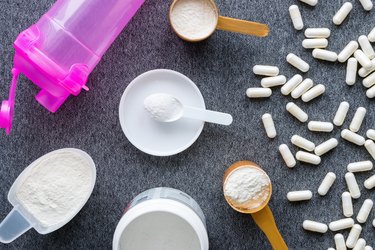
If you're immune to the odor that lingers after you pass protein shake gas, consider yourself lucky. While flatulence is something we all experience, the particular smell we let off after eating certain foods could be an indication that what you're putting in your body is not agreeing with you.
Tip
The first step to reducing or even eliminating protein powder gas is to read the ingredient label. Look for milk-based ingredients as well as gluten and other gas-producing culprits that may be lurking in your favorite powder.
Video of the Day
What Causes Protein Shake Gas?
To understand the cause of protein shake gas, you first need to know how and why your body produces it in the first place. According to the Mayo Clinic, gas is primarily caused by swallowing air when you eat or drink.
Video of the Day
That said, there are certain dietary factors that also come into play. For example, high-fiber foods can increase gas production as can sugar substitutes, carbonated beverages and fiber supplements.
The Cleveland Clinic also points out that the natural sugar in milk, which is called lactose, can also be a contributing factor. Since whey and casein are the two proteins found in milk, it makes sense that you may experience whey protein gas if you have issues with lactose.
When your digestive system can't break down and absorb the lactose, your body often responds by producing digestive distress, which includes gas. While the uncomfortable and often embarrassing odor you produce may cause some embarrassment, don't forget that passing gas 14 to 23 times a day is normal.
To get a better idea if protein powder is causing an increase in flatulence, your doctor may ask you to keep a food diary and record how often you produce gas after consuming the powder. If they suspect a deficiency of lactase, which is an enzyme responsible for lactose intolerance, they will likely ask you to avoid dairy products to see if things improve. Eliminating dairy products allows you to avoid consuming lactose, which is a sugar found in milk.
Prevent Protein Powder Gas
If dairy issues are ruled out, you may want to examine the other ingredients in your shake, and more specifically, look at the types of fruit you're using. High-fiber fruits such as strawberries, raspberries, bananas and mangoes, could be contributing to your whey protein gas, especially if you've recently increased your intake.
That's because adding too much fiber at once can create bloating, cramping or gas, according to the American Academy of Family Physicians. A simple solution to this problem is to change up the fruit you use. Consider adding less high-fiber fruit and mixing it up with some fruit that is lower in fiber such as grapes and melons.
Another contributing factor to your uptake in gas could be the type of protein you're consuming, especially if it is milk-based. Therefore, if you're using a whey or casein protein powder, you may want to consider switching to a plant-based, non-milk source product such as pea, hemp or rice.
Also, gulping down your protein shake too fast could be another reason you're experiencing protein shake gas. The National Institute of Diabetes and Digestive and Kidney Diseases explains that swallowing excess air when eating or drinking too fast can lead to more gas.
And finally, even if a milk-based protein powder is the cause of your excess flatulence, there are other ingredients that may cause you to pass more gas. Some protein shakes are also meal-replacement powders and may contain ingredients like gluten. If you have an allergy to one or more of the proteins found in wheat or are sensitive to gluten, you may experience whey protein constipation, bloating and gas, according to Harvard T.H. Chan School of Medicine.
- The Mayo Clinic: "Gas and Gas Pains"
- The Cleveland Clinic: "Gas: Burping, Belching, Flatulence"
- The National Institute of Diabetes and Digestive and Kidney Diseases: "Symptoms and Causes of Gas in the Digestive Tract"
- American Academy of Family Physicians: "Fiber: How to Increase the Amount in Your Diet"
- Harvard T.H. Chan School of Medicine: "Gluten: A Benefit or Harm to the Body?"
- The Mayo Clinic: "Lactose Intolerance"
Was this article helpful?
150 Characters Max
0/150
Thank you for sharing!
Thank you for your feedback!